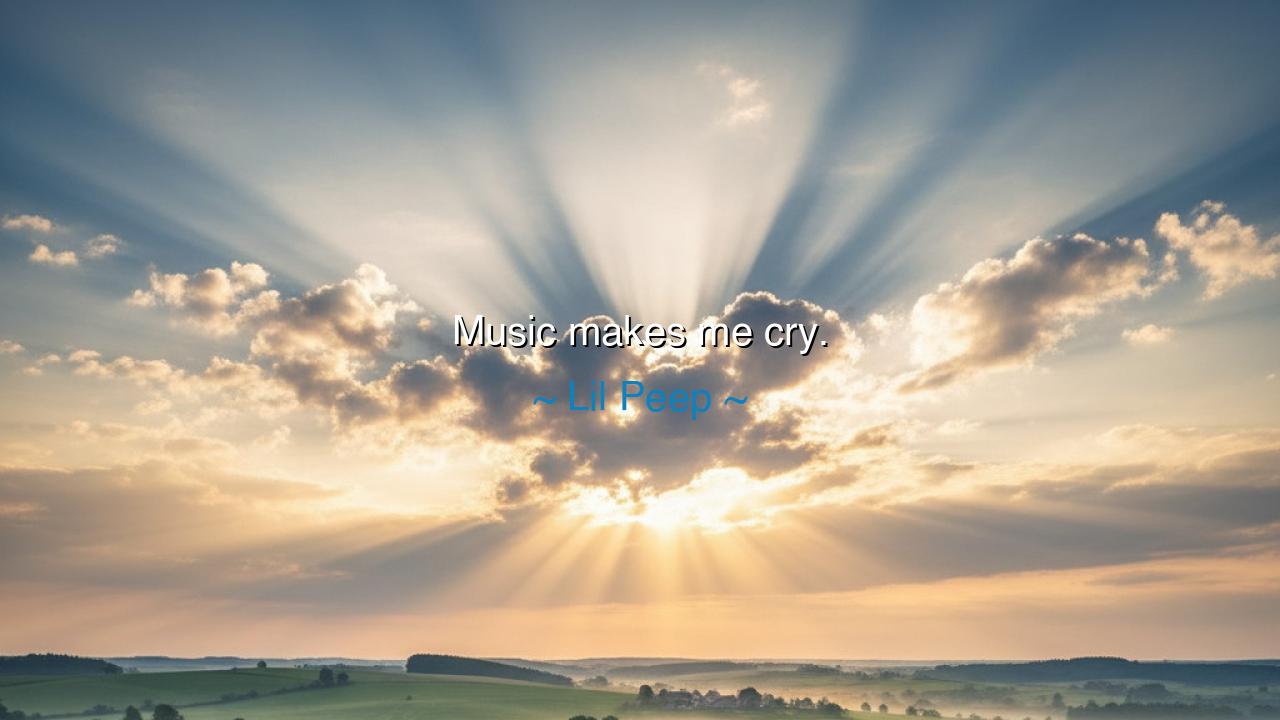
Music makes me cry.






The simple words of the fallen poet, “Music makes me cry,” speak more deeply than entire volumes of philosophy. They are not merely the confession of a man but the testimony of the human soul itself. For from the dawn of time, music has been the language of the heart—the bridge between silence and speech, the current that carries emotions too vast to be held within words. To weep at its sound is no weakness, but a recognition that melody touches what reason cannot, that harmony awakens the hidden chambers of our being.
In the days of the ancients, the Greeks believed that music was not merely entertainment but a force that shaped the soul. Plato spoke of modes that could summon courage or breed sorrow, of rhythms that could discipline the mind or loosen it into chaos. The heart responds to sound as the sea responds to the pull of the moon. Thus, when Lil Peep uttered his fragile truth, he joined his voice with millennia of those who knew that music pierces deeper than the sword.
Consider the tale of Orpheus, who with his lyre descended into the underworld itself. He played not to delight, but to grieve, to win back his beloved from the grip of death. His song was so sorrowful, so beautiful, that even the shades of the dead paused in their lamentations. The rivers ceased their rushing, and Hades himself wept. If such power dwelled in the strings of one man’s instrument, is it strange that in our own age, a youth burdened with pain would confess: “Music makes me cry”? His words echo Orpheus, not in myth, but in the raw, real struggles of a heart torn between longing and despair.
For Lil Peep, like many wandering souls, music was both wound and healing. It reminded him of his loneliness, yet also gave him company. It revealed his sorrows, yet also gave them beauty. This paradox is the essence of music: it wounds, but it also consoles; it pierces, but it also binds. In this way, tears are not the sign of weakness—they are the overflow of truth. They are the river released when the dam of silence breaks.
Let all who hear these words understand: when music moves you to tears, it is not merely a passing emotion. It is your soul recognizing itself in the mirror of sound. Just as rain nourishes the earth, so do tears nourish the heart. They cleanse, they release, they remind us that we are not stone, but flesh—alive, feeling, and bound to others through the universality of sorrow and joy.
Therefore, the lesson is this: do not flee from the tears that music draws forth. Embrace them. Let them wash over you as a baptism of the heart. In your solitude, allow music to be your companion; in your grief, let it speak the words you cannot form; in your joy, let it exalt you beyond what speech can hold. For in every note lies a fragment of eternity, a reminder that even suffering can be transformed into beauty.
Take, then, these practical steps: when overwhelmed, do not silence your pain with distraction, but turn to the song that mirrors your heart. When numbness clouds you, listen until the tears break through, for tears are proof that you yet live. And when joy swells within you, let music raise it higher, so that your spirit may soar beyond the confines of flesh. In this way, music will not only make you cry—it will make you whole.
Thus, remember always: to weep at music is to be truly human. The tears are not defeat; they are the purest expression of life itself. And when the world grows heavy, recall the words of Lil Peep, and let music open the floodgates of your soul. For only through such surrender will you find the strength to rise again, reborn in song.






AAdministratorAdministrator
Welcome, honored guests. Please leave a comment, we will respond soon